Manchester Arena bombing: Saffie Roussos's parents on hearing the truth
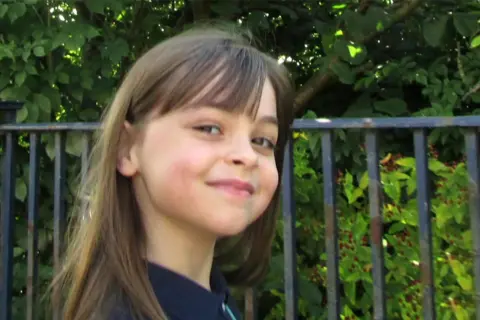 Family handout
Family handoutLast month, the inquiry into the bombing of an Ariana Grande concert at Manchester Arena heard its final scheduled evidence. The BBC's Judith Moritz has followed the family of Saffie-Rose Roussos - the youngest of the 22 victims - as they have uncovered details of their daughter's death while learning to live with their grief.
Saffie Roussos' bedroom looks just how you would expect an eight-year-old's room to look. Her name plate is on the door. Her vibrant My Little Pony dressing gown hangs on a peg. Her tiny pink Converse boots sit on a chair. And at the centre of it, her white bed is festooned with scatter cushions, fairy lights and pom poms.
Her artwork adorns the walls. A painting which reads, "I love mummy so much" and a drawing of the whole family, with "me, Saffie", written in felt tip.
But Saffie has never visited this room. And although the bed is beautifully made up, she'll never sleep in it. Saffie's childhood stopped abruptly when she was murdered in the 2017 Manchester Arena bombing.
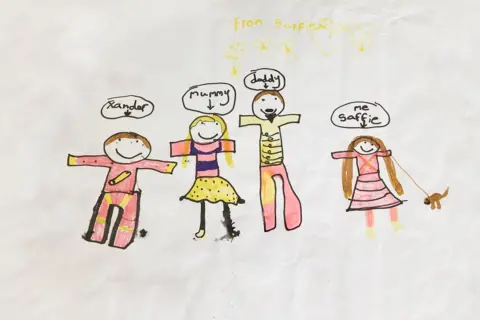
Before she was killed, Saffie lived with her parents Lisa and Andrew, and brother Xander, in their flat above the family fish and chip shop in Leyland, Lancashire. But when the bomb went off, their lives were changed in a fraction of a second.
After the explosion they never returned home. They never opened up the chippy again. Lisa went through months of hospital treatment, and when it was over the family went on holiday to Dorset. And they decided to stay there for good.
"We just basically escaped. I suppose a bit like running away," says Andrew Roussos.
Saffie's things were packed up, and for a long time her parents found it too painful to go through them. Their move south gave them space, and put distance between them and the intensity of Manchester. There, the civic "bee" emblem had taken on a new dimension, spread across the city on posters, walls and tattoos. Lisa found it both supportive and stifling.
She says: "In the north, where it happened, they still talk about it now. They still think about the families and everybody, and that's beautiful and I wanted that. But at the same time, with us moving here, you can pick and choose when to look at it, when to face it. It's quiet, you've got the sea, the countryside. I think it was the best decision."
Lisa admits she had been torn. She initially did not want to move as she felt she was moving away from Saffie, wanting to be where she had lived.
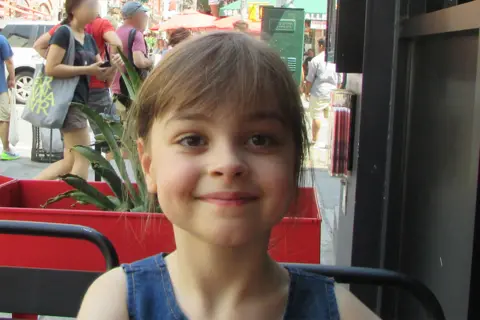
It was a while before she realised that it would be possible to relocate, and still feel close to her little girl. "Saffie will always be with us," she says simply.
Lisa and Andrew started house-hunting. They needed a two-bedroom house, for themselves and Xander, but they decided to search for a three-bed. Saffie would have her own room again as her parents decided it was time to unpack her belongings, and create a new room for her.
Lisa explains they did not want to put her things away into cupboards or the loft, wanting instead to move forward with Saffie.
"We've changed the knobs on her wardrobe. Even though we wanted to keep her furniture, I've updated it a little bit because I know she would like new things.
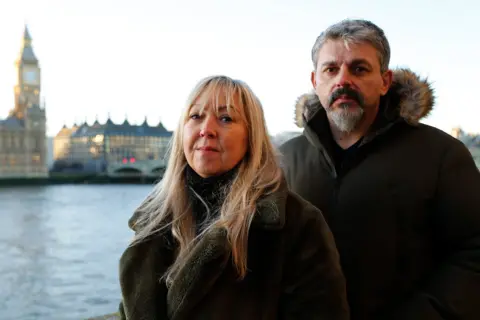
The Roussos family is an intensely private unit. They take comfort in each other, and have largely eschewed public attention. But they have always wanted the world to know how special Saffie was to them. That is what led them to invite me to their home as part of the process of making our film about Saffie for Panorama.
I first met Andrew just weeks after the bombing, when Lisa was still in hospital and the family was reeling from the attack. He told me then that Saffie had always wanted to be famous for singing and dancing like her idol Ariana Grande.
He could never have imagined that her name would be connected with the singer's for the most tragic reasons. He said he was determined to reclaim the joy that had surrounded his daughter during her short life. That meant telling as wide an audience as possible about the wonder of his little girl and the happiness she brought.
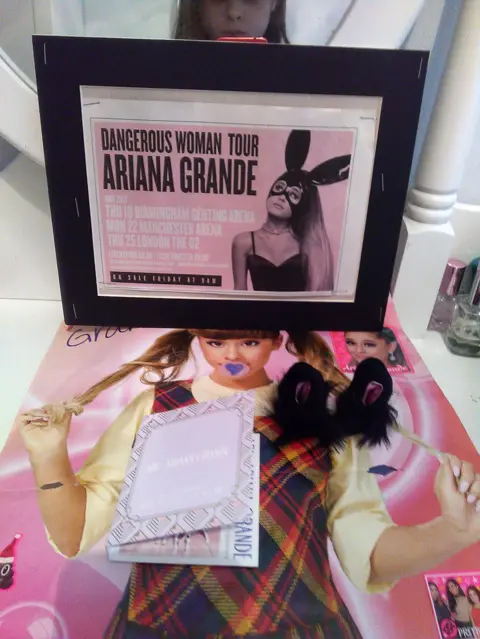
We filmed an interview and I told Andrew to keep in touch. I also asked him if Lisa was likely to want to say anything publicly when the time was right. There was significant media interest in their story, and I wondered if she would be as keen to speak about Saffie as her husband.
A few weeks later, Andrew suggested that I visit the couple at Wythenshawe hospital in Manchester. Lisa had been so badly hurt in the attack that she was initially only given a 20% chance of survival. By the summer of 2017, they were living as a family in hospital accommodation while her treatment continued.
When I met Lisa, it was clear that the time was not right for her to do an interview. She was having to cope with her own rehabilitation while coming to terms with the news that her youngest child had not survived the atrocity. I had been invited to meet her as a journalist, but I am also a mum, and my heart went out to her on a personal level. I had been to the arena with my own children a few weeks before the bombing, I knew that it could have been me in Lisa's shoes. I struggled to find the right words to express my sympathy.
It took another two years before Lisa decided that she wanted to talk publicly about what she was going through, and another two before she reached the point of inviting me to see her daughter's room in Dorset. She said she wanted to show me something special.

Watch Panorama
Manchester Arena Bombing: Saffie's Story is on BBC One Monday 7 March at 20:00 or watch later on BBC iPlayer

There, we sat on Saffie's bed - she felt it was finally time to look through her daughter's baby box of keepsakes, something that she had found too painful after the attack, worried about the emotions it would unleash.

In fact, Lisa beams as she shows me the scan pictures, talking about the pregnancy and how Saffie would not stop moving, a real livewire as she had been throughout her life. Each treasure - her first lock of hair, her newborn ID bracelet - unlocks a memory and she basks in them.
She picks out a pair of miniature flip flops. "I bought them in Kefalonia. I remember pushing her in her pram with them on and they kept falling off."
The tears come, but they are mixed with laughter as Lisa remembers the happy moments. She and Andrew have spoken to me several times about the pattern grief has taken for them. They describe it as a constant never-ending presence that has evolved into something they are learning to live with.
At the same time, they have also reached the stage of wanting to find out more about what happened to Saffie. For a long time, they did not want to know a great level of detail. But as the public inquiry into the attack started in September 2020, their legal team prepared them for hard times ahead.
The couple had always believed that their daughter died within seconds of the bomb exploding, and that she had not suffered. But at the inquiry they learned that Saffie had lived for an hour, and that she had died as a result of blood loss from leg injuries. Her legs were never given tourniquets or splinted. Two sets of experts at the public inquiry are in dispute over whether she might have survived if she had received better emergency care.
Andrew says: "It was our biggest fear. Our minds were set to, 'right, a bomb detonated, she lost her life, and it went quickly'. So that's what we chose to carry on life with. Finding out exactly what happened is hard to take… It's torture on top of torture."
The couple have been represented at the public inquiry by Pete Weatherby QC, who explains: "Saffie was able to talk, able to drink water. In the ambulance something like 40 minutes after detonation she asked the ambulance staff if she was going to die. Therefore, the issue of whether there were further interventions that might have made a difference to Saffie became apparent."
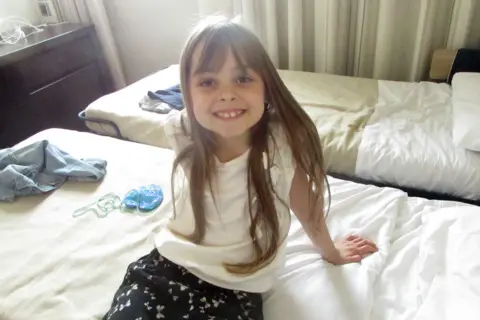 Family handout
Family handoutThe Roussos family solicitor, Nicola Brook, had to tell the couple Saffie had lived for a while, with an unknown degree of possibility about whether she could have survived. She then had to ask whether they wanted to explore that further.
"That is, without a shadow of a doubt, the hardest conversation I've ever had to have," she says.
Lisa and Andrew agreed they were ready to look into the intricacies of Saffie's case. But they have had very different approaches to the Manchester Arena Inquiry, which has been running for 18 months.
Andrew has followed nearly every day of the hearings by remote video link. Lisa has found them too distressing to listen to, and relies on Andrew to outline the main issues for her.
But when it came to giving evidence, both were determined to go into the witness box in person, and so they steeled themselves to make the trip from Dorset back up to Manchester. I joined them again that morning, as they packed their car for the trip, which Lisa confessed she had been dreading.
She said it had been causing her sleepless nights and she would not do it if she didn't have to. "I know it's going to be emotionally draining. But I just thought, 'Lisa, you've got to do it. You've got to do it for Saffie. She hasn't got that voice, so we have to give it to her.'"
At court, the couple told the inquiry about their experiences on the night of the attack. How Lisa lay on the floor of the arena foyer unable to move. And how Andrew spent all night searching for her and Saffie. He and Xander travelled to three hospitals, and only discovered that Saffie had died the following afternoon.
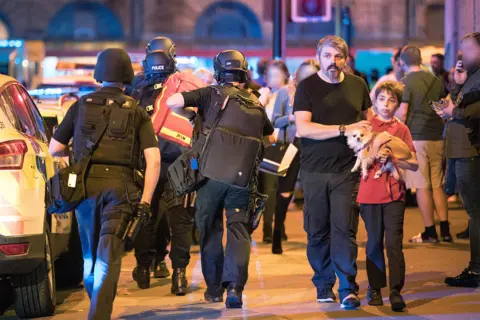 London News Pictures
London News PicturesThe public inquiry has given him an opportunity to dig deep into what happened. He says, "What drives me, I suppose, is knowing the information. So I'm there representing us as a family and Saffie as our daughter. Even though the legal team are there to do that, I want to know. I want to scrutinise everybody to the point of getting to the truth."
Grieving for a child can destroy a marriage. But Lisa and Andrew each say they could not have managed without the other. Their characters complement each other. Andrew is passionate and talkative. Lisa is a calming presence.
The experience of speaking in court was draining for them both. Afterwards they were clearly exhausted, but relieved. Lisa said she was glad she had taken part as it was her one chance to say what she needed to say. "The build-up to it was awful but I do feel better now that I've done it," she says.
But the couple are clear that the inquiry has to make a real difference.
Andrew says he is angry lessons still need to be learned: "My argument is why didn't you learn from 7/7? Why didn't you learn from 9/11? Why didn't you learn from the Paris attacks in 2016? This wasn't the first terrorist attack."
He adds: "I just hope the whole process of this inquiry does what it set out to do. What it's meant to do. We're never going to stop this… but at least at the next attack we'll be more prepared."
Their time at court was not the only intense moment of the family's trip to Manchester.
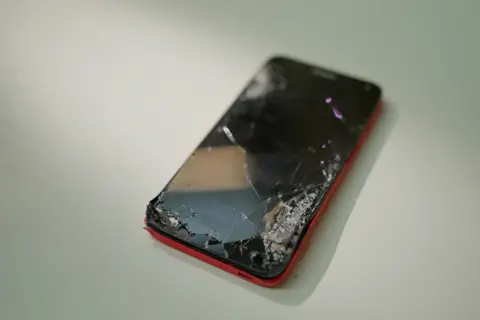
Saffie used to love playing with her mobile phone. She had taken endless selfies with it. Naturally, she took it with her on the night of the Ariana Grande concert. But it shattered in the blast and when it was returned to her parents, it seemed beyond repair.
Lisa and Andrew told me they had tried everything to make it work again. They badly wanted to look at the photos on it, to have a last glimpse of Saffie's world. I asked them if they would trust me to take the phone away for forensic work.
In truth, I was not sure if I would be able to get any results, so I was thrilled when I was able to tell them that despite such extensive damage, I was able to have the phone reconstructed - and there were photos to look at.
The pictures were Saffie's last selfies. She took them in the car with Lisa on their way to the concert. The little girl is wearing her Ariana Grande T-shirt, and beaming, on what should have been one of the happiest days of her life.
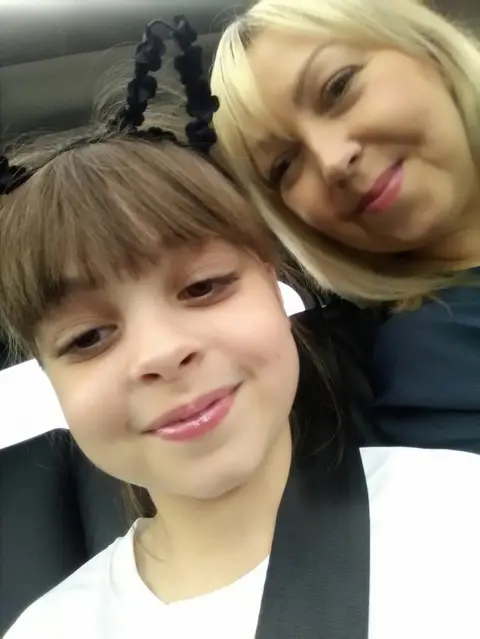
Tearfully, Lisa remembered them being taken. She said, "Me and Saffie were in the back of the car on the way to the arena. It's just so so sad… I wish I'd taken more pictures of me and her. You take them for granted because you don't think of the worst, ever. Why would you? But afterwards you realise how precious and important they are."
Although it is upsetting to see the selfies, Lisa and Andrew say they will always treasure them. They are determined that Saffie will always be a part of their lives. I ask Lisa about the concept of "closure" which is sometimes spoken about.
She says, "Who wants closure? It's the opposite. You can't have closure. You don't want closure. You want to take that memory with you forever. We want to take her with us forever. I want to talk about her. I want to remember her. I want everyone to remember her."
